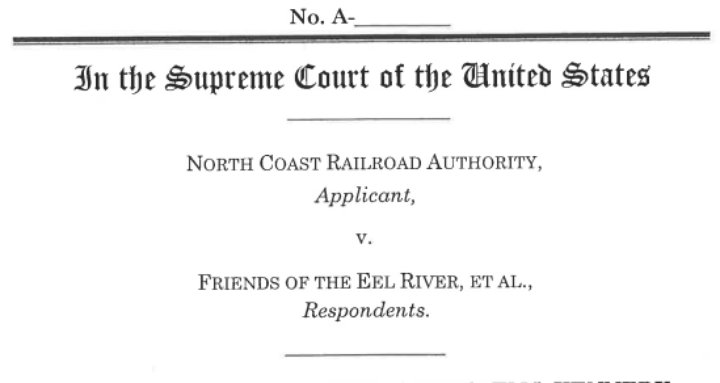
The big leagues.
The North Coast Railroad Authority will soon be asking the United States Supreme Court to overturn its legal defeat at the hands of two local environmental organizations this summer, and appears to have retained the services of a high-powered Washington lawyer in its quest to do so.
Near the end of July, the California Supreme Court ruled that the railroad authority – a financially troubled public agency that was created by the state legislature in the late ‘80s and early ‘90s to manage the railroad line between Humboldt County and the Bay Area – is, in fact, bound by California environmental law.
The authority has steadfastly maintained that it is free to ignore the California Environmental Quality Act, despite being having applied for and accepted state money in order to prepare an environmental impact report on the restoration of rail service – and, indeed, despite being an agency of the state of California itself.
Now it will attempt to take that case to the highest court in the land. Earlier this week, an attorney with a Washington D.C.-based law firm wrote to the Supreme Court to ask for an extension of time to file a petition begging the court to hear an appeal of the California Supreme Court ruling. The extension of time was necessary, the attorney said, as he was only recently retained and had to familiarize himself with the case.
“Only on September 29, 2017, did NCRA retain new Counsel of Record, Andrew Tauber of Mayer Brown LLP,” read the letter. “Mr. Tauber was not involved in the litigation before the California state courts and therefore must familiarize himself with the proceedings and arguments below. Mr. Tauber requires the additional requested time to research the legal issues fully and prepare an appropriate petition for consideration by this Court.”
The appeal to the Supreme Court raises the odd specter of an agency of the state of California spending public funds on high-powered Washington attorneys to argue that it should not be bound by California law, against the demands of California’s highest court. What’s more, it comes at a time when the most recent financial audit of the authority showed that it is running a $200,000-per-year deficit, with much of that attributable to legal costs.
Richard Marks, one of Humboldt County’s two representatives on the railroad authority’s board of directors, told the Outpost yesterday that he was “surprised” to hear that the authority’s staff had engaged attorneys in D.C. to prepare an appeal, but that he could not go into further detail as previous discussion of the matter had taken place in a closed session of the board.
Marks said, however, that the railroad’s finances were not quite as dire as they had been previously, as it is now receiving more income from the sale or lease of property along the line. He assured the Outpost that the authority would pay for the cost of any Supreme Court appeal out of its own budget, and not by soliciting outside funds.
But the NCRA — and particularly its finances — have also been under a microscope recently, after the California Transportation Commission held a probing question-and-answer session with the authority’s leadership back in June. By the end of it, the commission ordered the authority to come back to it with two new documents — a business plan and a “shutdown plan.” That should happen sometime in the coming months.
Scott Greacen, the conservation director of Friends of the Eel — one of two local environmental groups, along with Californians For Alternatives to Toxics, that took the original lawsuit up to the California Supreme Court — said today that he felt that the chances of the U.S. Supreme Court agreeing to hear the case (to “grant certiorari”) were small. But he said that his organization would be prepared to defend its case, and the decision of the California Supremes — basically, that a state government may decide how it wishes to operate its own agencies.
“In the unlikely event that the Supreme Court were to grant cert, we will vigorously defend our victory at the California Supreme Court,” Greacen said. “What’s important to us is that the California Supreme Court showed that you can harmonize federal railroad law with states’ right to insist that its own resources be spent in ways that affect our needs and priorities.”
It has been nearly 20 years since any trains have run to Humboldt County.
###
DOCUMENTS:
- ”Application to the Hon. Anthony M. Kennedy for an Extension of Time Within Which to File a Petition for a Writ of Certiorari to the Supreme Court of California.” Letter from Andrew Tauber of Mayer Brown LLP, on behalf of the North Coast Railroad Authority. Oct. 3, 2017.
CLICK TO MANAGE